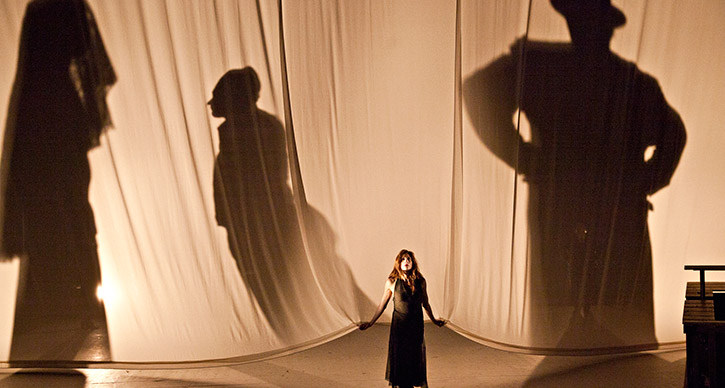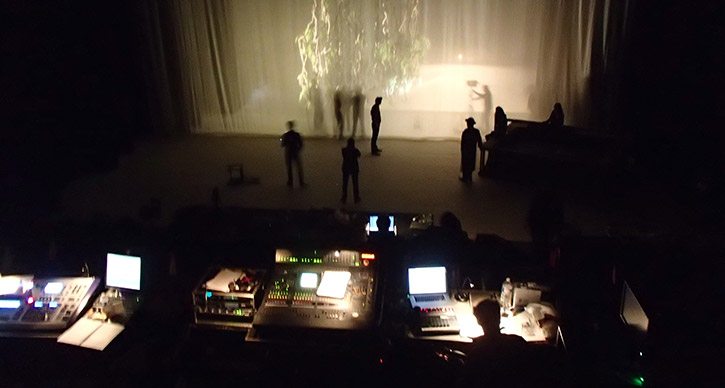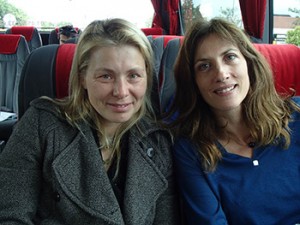Artist Interview: Traveling with Théâtre de la Ville
Editor’s note: This summer, UMS launched a new 21st Century Artist Internships program. Four students interned for a minimum of five weeks with a dance, theater, or music ensemble part of our 2014-2015 season. Héctor Flores Komatsu is one of these students. He spent five weeks with Théâtre de la Ville in Paris, France.

Théâtre de la Ville performs Six Characters in Search of An Author at the Power Center in Ann Arbor on October 24-25, 2014. Photo by JL Fernandez.
Scene
13:30, May 23, 2014, Paris, France. En route to final dress rehearsals of Six Characters in Search of an Author at Le Forum Blanc Mesnil, a banlieu (suburb) located at the northern outskirts of the city proper. Cast and production members sit throughout the van shuttle between Théâtre de la Ville and our current rehearsal space.
Les mecs (the dudes) hang out in the back, and one of their phones alternates between the American and French pop hits of the moment. Some nap, some read, some eat their lunch. They converse in the relaxed, soft, yet gutturally vibrant and “chic” French that had initially been both inviting and intimidating to my Mexican-American mélange of an accent.
Actress Sarah Karbasnikoff’s sweet, edgy, yet motherly voice, proper for her character, rises in joyous laughter, while actress Valerie Dashwood’s dark, yet subdued, cedar timbre seduces the air with chuckles, not unlike those heard from her character, the Step-Daughter. The laughter is inviting, I sit across them, speaking in “tu,” not “vous,” as they had requested.
We chat for the readers in Ann Arbor, of which Sarah has fond memories with Rhinos stampeding through the fallen autumn foliage. (Théâtre de la Ville last visited Ann Arbor to perform Ionesco’s Rhinocéros in 2012.)
Héctor Flores Komatsu: You are a very interesting mother-daughter stage pair! Could you talk a bit about your characters’ relationship in the show?
Sarah Karbasnikoff: Well, I play the Mother, who… Let’s just say she suddenly arrives at the theater with her first husband and all of her children.
HFK: Hmm…
Sarah: Ha! That’s what you need to know, I don’t think I should say more!
[Laughter]
Valerie Dashwood: As for me, I play the “Step-Daughter.” She is such because her mother…
Sarah: That’s me…
Valerie: Was initially married to the character of the Father, with whom she had…
Sarah: A boy.
Valerie: Yes, a boy… Just one boy.
Sarah: Voila!
Valerie: Afterwards, she “had” a second man, my true father, with whom she had three children of which I play the eldest, the Daughter.
HFK: What would you then say is the fundamental need, desire, of the mother, of the Step-Daughter, of the family as a whole? What is it? Is it love? Is it to unite the entire family? Is there a common desire as a family?
Sarah: Well, that will certainly differ for each character.
Valerie: For the Step-Daughter there’s no need or desire to be part the family. One of the first things she says is that she “will take off – fly away!” because she doesn’t want to be part of it.
Deep inside, she detests her Step-father, and she also hates his first, legitimate, son. She speaks a lot about legitimacy, because perhaps she doesn’t feel entirely legitimate. She doesn’t have legitimacy even within society, given that she’s had to prostitute herself to support her mother and siblings. That’s her point of view.
Her desire is, more than anything, is to self-destruct, through which she can emancipate herself from her family, become and adult.
HFK: She fights for her freedom!
Valerie: She fights for her freedom!
HFK: For the mother it seems to be quite the opposite.
Sarah: Each day I discover her a little more. At this moment I have the impression that, yes, she seeks to see her son again, that is certain, because she wasn’t there for him, and so there’s some degree of guilt. Her two youngest children die, and eldest daughter wishes to escape from her. So yes, her greatest desire is to bring everyone together but, alas, that’s impossible. Her life is her children, all of whom escape from her, leave her.

During rehearsal with Théâtre de la Ville. Photo by Héctor Flores Komatsu.
HFK: How has the process been for you, as a new actress in this restaging, stepping into a role originated by someone else?
Sarah: Well, first one must do what’s already been done and understand what already exists. I’ve been stepping into the shoes of the original actress.
And now, with each run, I begin to understand the reason behind her movements, the psychological motivations. At first they were mere just movements, crossing from one place to another, and I simply memorized them; it was very concrete, very technical work. And then, from that point, I began to create the character.
HFK: For you Valerie, having played this role in the original production twelve years ago, what has it been like this time? What has been unearthed once more? What has been newly discovered?
Valerie: What’s been really interesting for me, since it’s been twelve years since I played this role in the original production, is that upon returning to this play, I could not perfectly recall many specifics, but I still had a global feeling of the character, the violence, the pain, and of the will – that’s what it is! The will of the character, is what I remembered well.
However, I could barely remember the text – except for the song! Bizarrely, that had completely stayed with me; I remembered the song… but not my lines!
But then when we read out the play all together at Théâtre de la Ville, with Hugues [Quester, who plays the Father] and Alain [Libolt, who plays the Director], hearing their voices and feeling their energies through the text, the memory came back to me. By reading with them, I was surprised to feel the same emotions from years ago resurface, as if something which long laid dormant suddenly awoke, opening itself. Voila!
After that, relearning the text was very easy.
HFK: What is different today, than how it was twelve years ago?
Valerie: The biggest difference is that twelve years ago I didn’t have children, and now I’ve had two. So my maternal instinct, the one my character has for her little sister, feels very different. Motherhood has hit me hard, and it affects how I act, even in the way I look at the little girl. Sans resorting to any psychological tricks, I instinctively see my daughter in the little girl. I have a child now… And that fact greatly affects how I act, knowing that this little girl, in the play, will die.
I don’t think I could ever do this in the same way as I did twelve years go.
Also, having worked so much in just the past ten years, I feel much more physically available in my own body, much more reserved. At the time, the nudity had originally been somewhat difficult for me, but much less so nowadays. That scene, which I came to fear, I now approach with serenity, even when it’s hard to play.
HFK: And now for my last question for you. I’ve noticed that there’s a lot of love and care behind the scenes among the cast. And for you two, who play Mother and Daughter on stage but are much closer in friendship and in age off-stage, how does that affect your stage relationship?
Valerie: All I can say is… Just like in our previous play, I played the mother to Sandra [another Théâtre de la Ville actress who also plays one of the “actresses” in Six Characters]. I never feel the need to ask myself whether this is or isn’t “coherent,” even if we are only twelve years apart. In theatre, we have what we call, at least in French, a “convention” to suspend disbelief. So right now, Sarah may be playing my mother, and we understand each other really well, which is good because playing this relationship requires great emotional investment. We can support that off-stage. Our closeness strengthens the bond vital to plunging into the work together.
Sarah: For me it’s very similar. During the show I don’t think at all about the age difference. To feel Valerie as she plays her character, I do nothing more than to say “she’s my daughter.” That’s it, I don’t see the age at all. There’s also an understanding of our respective pains, because we know each other personally. That really gets me, it truly does. She does, her pain. She might not truly be her character, but we form an affinity, a bond.
We streamline into casual conversation, and soon enough arrive at the theater. An hour into the rehearsal, as everybody gets into costume and warms into their roles Valerie receives a phone call. Her youngest child isn’t feeling well. She ponders the symptoms, trying to figure the right remedy. There’s the natural concern of the working actress-mother in the midst of rehearsals. She seeks her stage-mother Sarah, a veteran mother in various senses, for reassurance. That’ll do it,” Sarah says. For a moment, the parallel lines of reality and fiction intersect, not unlike in the play, as the two women connect through maternity.
Interested in more? Look for Flores’s behind-the-scenes photo-essay covering his time with the company.



